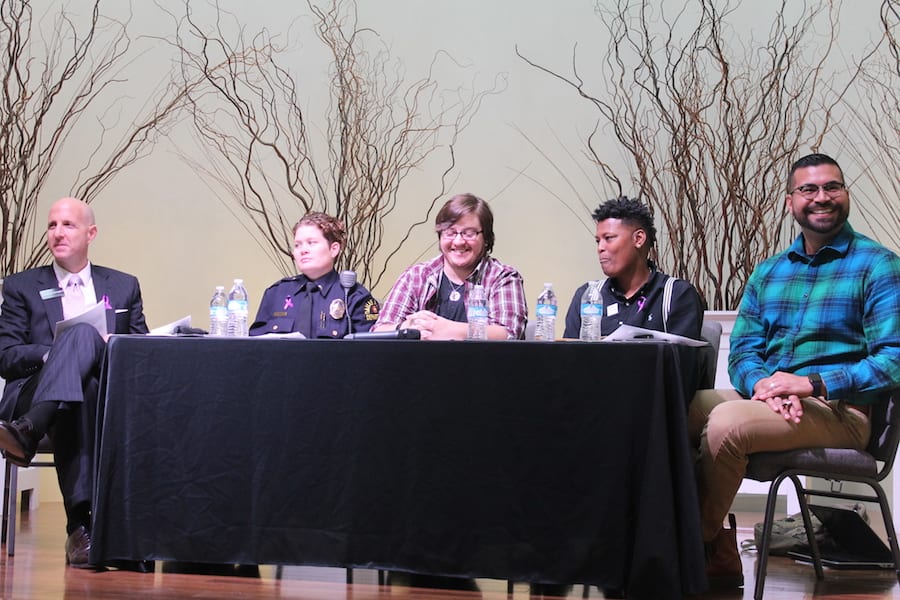
The panel, from left, included District Court Judge Brandon Birmingham, DPD officer Kylee Hawks, Aricles James, Angela Lee and Roy Rios.
Candy Marcum moderated a panel on domestic violence in the LGBT community on Saturday, Oct. 28 at the Interfaith Peace Chapel. Panelists were from the Texas Council of Family Violence, The National Domestic Violence Hotline, which is based in Austin, a member of the Dallas Police Department’s Domestic Violence Unit, a District Court judge and a victim of domestic violence.
Angela Lee, manager at the National Domestic Violence Hotline, said a large number of the calls her organization receives are from members of the LGBT community. In 2016, 290 calls were from trans men, 226 from trans women and 694 calls from non-binary and other trans people. She said those statistics are only from those who self-identified.
One problem for police trying to identify victims of domestic violence is how those victims report. They’ll often refer to a spouse as a roommate. Reporting domestic violence often includes outing gender identity or sexual orientation or revealing HIV status. And while police assume the abuser in an opposite-sex relationship is the man (although that’s not always true), it may be harder to identify the perpetrator in a same-sex relationship, especially among police not trained to work with the LGBT community.
Roy Rios from the Texas Council on Family Violence said one in four gay men experience intimate partner violence, the same rate as straight women.
Intimate Partner Violence may take many forms. In addition to assault, it may include verbal abuse or financial or economic control — any behavior that makes the victim do what the abuser wants.
Ari James, an abuse victim whose story appeared in Dallas Voice, said violence in the LGBT community doesn’t look any different than in opposite-sex relationships. When he reached out for help, however, he was referred to a batterer intervention program.
“A lot of services don’t know how to direct [LGBT] people,” he said.
On average, an abuse victim leaves and returns seven to nine times before making a final break.
“When power is taken away, the risk is higher,” Rios said.
He explained that while the abuser has power, the victim is safer. Murders of abuse victims by the abuser usually occur after the victim has left.
The Salvation Army and Genesis Women’s Shelter provide housing for abuse victims in secure, undisclosed locations. A new 20-bed shelter is being built for men. Both organizations welcome the LGBT community and the Salvation Army in Dallas works particularly well with the transgender community.
— David Taffet

